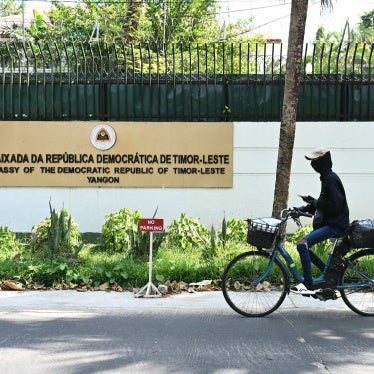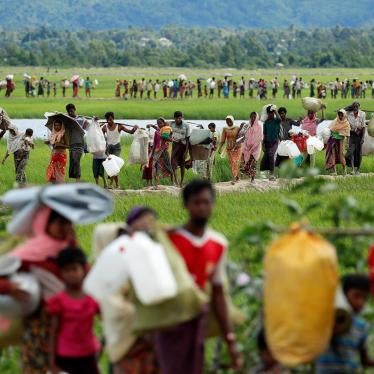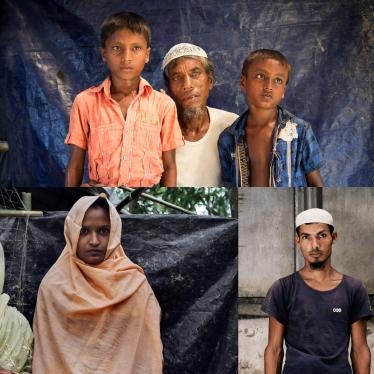(New York) -- Human Rights Watch today urged the United Nations Commission on Human Rights to vote for the creation of an international commission of inquiry into possible crimes against humanity in East Timor. But the group warned that the effectiveness and credibility of an investigation could be undermined if it were closely tied to the Indonesia's National Commission on Human Rights, commonly referred to by its Indonesian acronym, Komnas-HAM.
On Monday afternoon, delegates to a special session of the U.N. Human Rights Commission in Geneva will vote on a resolution calling on the UN Secretary General to establish an International Commission of Inquiry. The resolution emphasizes that the International Commission should work in cooperation with the Indonesian National Commission on Human Rights to gather information on "possible violations of human rights and acts which may constitute breaches of international humanitarian law in East Timor" since January 1999.
Komnas-HAM has a well-deserved reputation for independence in Indonesia but not in East Timor, where it is seen as having played a pro-Indonesia role, particularly in the months preceding the August 30 referendum. East Timorese witnesses to human rights violations by the Indonesian army or army-backed militias are not likely to trust investigators seen as being linked to the Indonesian government. It is therefore critical that any international commission of inquiry be seen as wholly independent of Komnas-HAM.
"We would expect the international commission to cooperate with a wide range of Indonesian and East Timorese human rights organizations," said Joanna Weschler, U.N. representative of Human Rights Watch, from Geneva. "But mentioning Komnas-HAM by name in the resolution suggests a stronger linkage, and we're worried about the implications."
Human Rights Watch is also concerned that nowhere in draft resolution is the word "investigate" used. Rather, the resolution merely says the international commission should "gather" and "compile systematically" information on possible violations. No explicit reference is made to the information being used for prosecutions of those responsible.
One member of Komnas-HAM told Human Rights Watch that he and other colleagues who very much want to see an end to military impunity believe that the only way Indonesian perpetrators can ever be brought to justice is if the Indonesian government has a stake in the investigation process. Virtually all of the perpetrators, and some of the evidence needed to prove crimes against humanity, are in Indonesia, not East Timor. That political reality may be why the drafters of the resolution inserted a clause about cooperation with Komnas-HAM.
But Indonesian officials, both civilian and military, have repeatedly denied any government involvement in the violence that occurred both before and after the August referendum. They have shown no interest in seeing justice done. It is therefore doubly important that any international commission of inquiry retain complete operational independence from the Indonesian government or institutions seen in East Timor as being linked to it.
There has been much debate about whether the U.N. Human Rights Commission has the capacity to respond appropriately to a human rights emergency. If this special session of the Commission, only the fourth in history, fails to produce a viable investigative mechanism for a situation as grave as that in East Timor, the credibility of the Commission as a whole will be severely weakened.
Komnas-HAM's record on East Timor is not wholly negative. In January 1995, for example, Komnas sent a team to East Timor after soldiers shot and killed six civilians in the district of Liquica. Komnas found that the six had been tortured before being killed and that the army had tried to prevent the families from finding out how their relatives had died. As a result of the investigation, two soldiers were tried and sentenced to four years and four years and six months respectively for violating procedures.
But overall, the record has not been good. For example:
- In 1994, the U.N. Special Rapporteur on Extrajudicial, Summary or Arbitrary Executions concluded after a visit to East Timor that, "The Indonesian National Human Rights Commission was not the most appropriate body to deal with human rights violations in East Timor. Its mandate, means of actions and methods of work are insufficient. Furthermore, it is not trusted by the population of East Timor."
- Komnas opened its first branch office in July 1996 in East Timor. It was staffed by a former Indonesian prosecutor who did not speak the local language, and was located directly across the street from the district military command. As a result, it got almost no complaints from local residents. When the branch director was finally replaced, Komnas named as his successor an East Timorese who was an active member of Golkar, the ruling party, and who was solidly identified with the pro-integrationists.
- Komnas's activities in East Timor became highly politicized after President Habibie announced in January 1999 that East Timorese would be given the option of independence. On April 21, following two major eruptions of militia violence in Liquica and Dili in which several dozen people were killed, the Indonesian government announced the formation of a Commission on Peace and Stability (abbreviated KPS in Indonesian) with Komnas as the lead agency. Komnas members of KPS repeatedly downplayed the extent of military involvement with the militias and allied themselves with government officials against UNAMET.
The fact that Komnas-Ham has been discredited in East Timor may have more to do with specific individuals than with the institution as a whole, and many members of Komnas remain committed to working for justice and accountability in East Timor. The damage, in East Timorese eyes, however, has been done.








